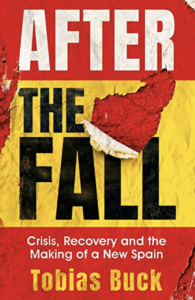
Spain’s crisis recovery


Spain took the brunt of the 2008 financial crisis as overnight the money dried up and the country’s speculative housing boom imploded prompting investors to flee. Even banks went to the wall with loss of millions of jobs.
Tobias Buck arrive d in 2012, in the midst of country’s devastating financial crisis. Many young Spaniards had left. Those who stayed behind learned to take each day as it came, praying for austerity to end.
By 2017 Spain had recovered economically but the country’s lost decade opened other wounds , social, constitutional and political.
Spain’s property boom and subsequent bust is graphically described with chronological detail against a backdrop of post-fiesta Valentia.
After the fall presents a rich and vivid portrait of contemporary Spain at a critical juncture in the country’s history. The books spans Spains long boom and sudden bust, the brutal economic crisis that followed and the political and social aftershocks that reverberated to this day. It also esplores the origins of the separatist movement in Catalonia and its bitter clash with the Spanish government that culminated in a failed secession referendum and a divisive declaration of independence.
Spain move away from the old biparty duopoly between the socialist and popular parties, to the rise of Podemos on th far left and Vox on the far right.
Buck looks into the Basque country and its decision to put down arms in 2011 as evidence that “murderous hatred can be overcome”.
Spain remains reluctant to adder3ess the legacy of Francoism.
Tobias Buck was the Financial Times Madrid correspondent from 2012 to 2017, covering Spain’s economic crisis and the political aftershock and currently the FT’s Berlin correspondent. Buck not only understands people but also economics.
After the Fall: Crisis, Recovery and the making of a New Spain by Tobias Buck, Weidenfeld & Nicolson £20, 320 pages.
